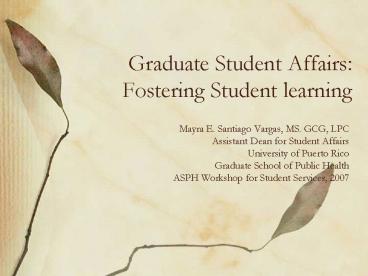Graduate Student Affairs: Fostering Student learning - PowerPoint PPT Presentation
1 / 17
Title:
Graduate Student Affairs: Fostering Student learning
Description:
Mayra E. Santiago Vargas, MS. GCG, LPC Assistant Dean for Student Affairs University of Puerto Rico Graduate School of Public Health ASPH Workshop for Student ... – PowerPoint PPT presentation
Number of Views:114
Avg rating:3.0/5.0
Title: Graduate Student Affairs: Fostering Student learning
1
Graduate Student Affairs Fostering Student
learning
- Mayra E. Santiago Vargas, MS. GCG, LPC
- Assistant Dean for Student Affairs
- University of Puerto Rico
- Graduate School of Public Health
- ASPH Workshop for Student Services, 2007
2
Objectives
- Linking theory to the practice of student affairs
at the graduate level. - Share with participants the idea of a student
affairs division that contributes to student
learning at the graduate level.
3
Introduction
- Most of the available research on graduate
education highlights the departmental role in
supporting the academic experience - The research on doctoral students point to
- A need for support beyond the academic experience
- A role for student affairs professionals in the
development of the whole graduate student.
4
Interaction between academic and student affairs
in some institutions
Gap
5
Collaborative interaction
Area of collaboration
6
- Strategic areas where departments and student
affairs can have an effect - Orientations
- Advising and registration
- Financial aid and financial planning
- Community building
- Social interaction and activities
- Counseling
- Professional development and career planning
7
Models that guide student affairs practice
- Service model
- The primary purpose of student services is to
support the academic mission by providing
adjunctive services - Student development model
- College student affairs professionals focus on
developmental phases or tasks that students
experience as they pursue a college education.
8
Models that guide the student affairs practice,
cont.
- Student learning model
- Places its emphasis on shared efforts with other
educators, faculty, and administrators to achieve
a more integrated or seamless learning
experience.
9
Student learning model
- Teaching or instruction is a method and not an
end of education (Barr Tagg 1995). - Emphasis is placed on the outcomes of learning.
- Research and data collection to identify student
needs and measure the impact of interventions
10
Student learning model
- Linked academic and student affairs divisions
place student learning at the center of their
joint enterprise and create institutional
coherence about student success. - If one assumes that the purpose of an educational
institution is to provide learning, then everyone
who works with students is engaged in achieving
this purpose.
11
Principles of good practice for student affairs
- They are as follows
- Engages student in active learning.
- Helps students develop coherent values and
ethical standards. - Sets and communicates high expectations for
student learning. - Uses systematic inquiry to improve student and
institutional performance.
12
Principles of good practice for student affairs,
cont.
- Uses resources effectively to achieve
institutional missions and goals. - Forges educational partnerships that advance
student learning. - Builds supportive and inclusive communities
13
Strategies to implement the principles of good
practice
- Employ ongoing assessment of student outcomes
- Communicate institutional values and expectations
through policies, decisions, processes, and
interactions. - Link the classroom with out-of-classroom
activities
14
Strategies to implement the principles of good
practice
- Provide high-quality services and programs that
support student learning. - Establish coherent purposes and learning outcomes
appropriate to the backgrounds and aspirations of
students and consistent with the institutions
mission. - Encourage student involvement.
15
Strategies to implement the principles of good
practice
- Value diversity, accept differences among
students, and work to overcome prejudice on
campus. - Involve students in institutional governance,
policies, and decisions. - Develop a student-centered focus.
16
Strategies to implement the principles of good
practice
- Increase the intellectual content of students
affairs activities. - Create flexible networks of resources.
- Use a systemic approach.
- Create the ethic of caring.
17
Thanks for your time































